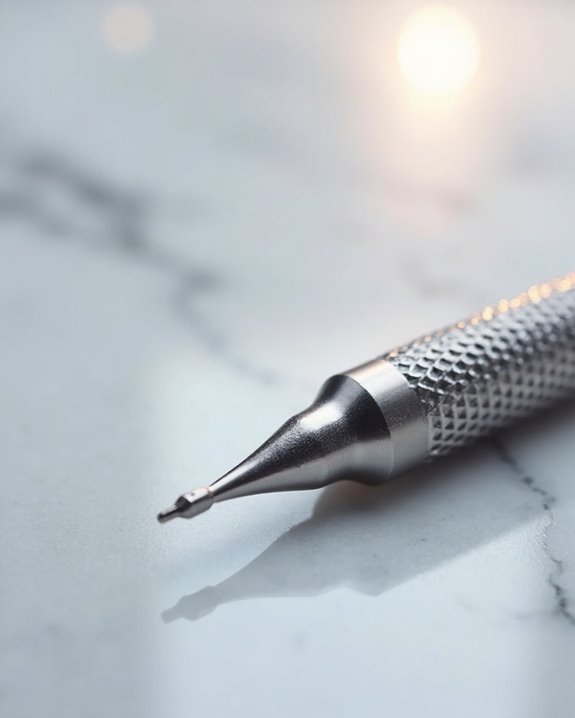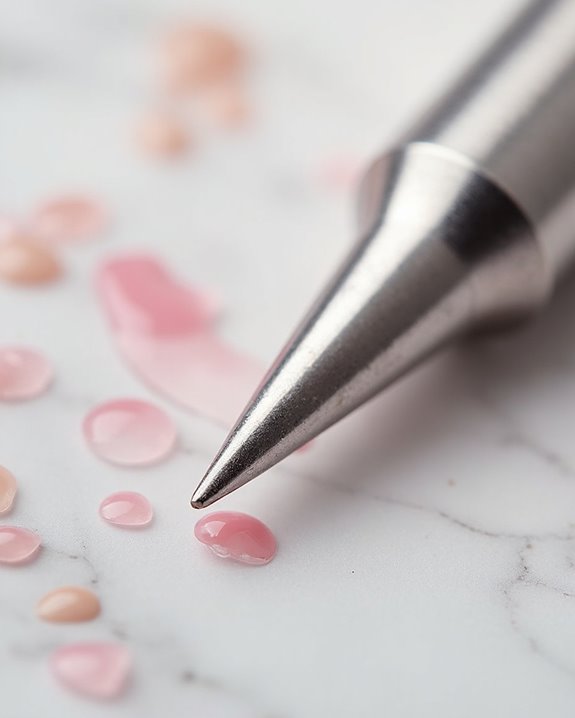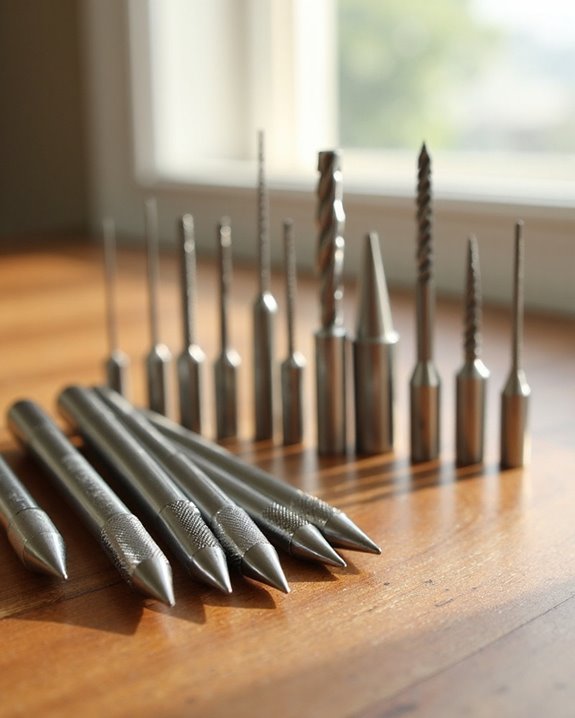Are nail drill bits universal? No, they’re not, as you’ll find compatibility varies based on specific factors like shank size, material, and purpose. Most bits have a standard 3/32-inch shank, fitting many drills, though 1/8-inch sizes need adapters to avoid wobbling. Materials such as ceramic, diamond, or carbide suit different tasks, like polishing or acrylic removal, while shapes and speed ranges, from 20,000 to 35,000 RPM, must match your machine. Explore further for deeper insights.
Key Takeaways
- Nail drill bits are not universal due to varying shank sizes, like 3/32 inch standard or 1/8 inch requiring adapters.
- Material differences, such as ceramic, diamond, or carbide, affect compatibility with specific tasks and tools.
- Bit shapes, like barrel or cone, are designed for distinct purposes, limiting universal use.
- Speed requirements vary, with bits optimized for 20,000 to 35,000 RPM, needing machine compatibility.
- Using adapters and matching specifications can enhance versatility, but not all bits fit every drill.
Understanding Nail Drill Bit Compatibility
While you might assume all nail drill bits work with any machine, the reality is that compatibility hinges on several technical factors you’ll need to evaluate before making a purchase. First, consider the shank size, a critical detail that determines if a bit fits your drill’s collet, as mismatches can prevent secure attachment or damage the machine. Beyond this, the different materials of nail drill bits, like durable carbide, play a role in suitability, since carbide bits excel at heavy-duty tasks such as acrylic reduction but may not suit delicate polishing on certain drills.
Next, make sure the bit aligns with your machine’s RPM range, as specific speeds optimize performance, preventing inefficiency or potential harm during use on varied nail surfaces.
Furthermore, selecting the right collet assembly can prevent bit-slipping problems, ensuring a secure fit for your drill’s components.
Exploring Different Shank Sizes
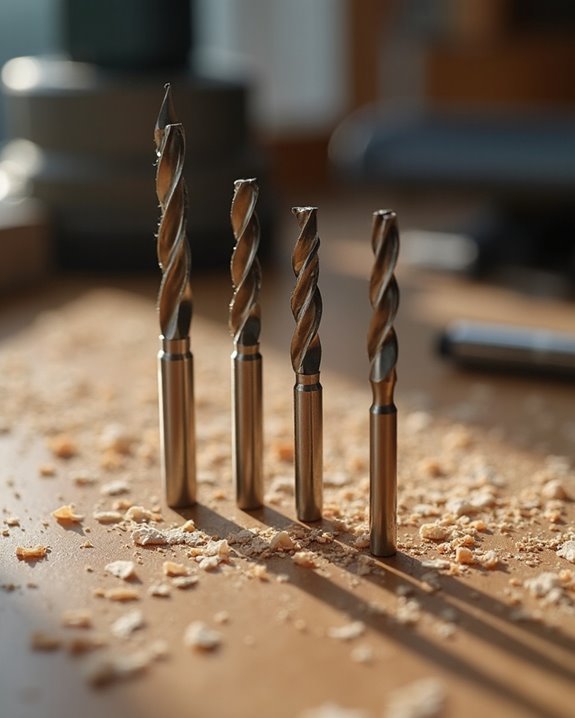
How can you make sure that a nail drill bit fits your machine perfectly? When exploring different shank sizes, you’ll notice that nail drill bits come in a variety of dimensions, and compatibility is key to safe, effective use. The standard shank size for most professional tools is 3/32 inch (2.35 mm), fitting the majority of salon and home electric drills, while a secure fit prevents wobbling during operation.
However, some drill bits are sized at 1/8 inch (3.175 mm), often used in dental or industrial machines, and won’t fit standard nail drills without an adapter, which can bridge the gap for versatility. Always check your drill’s collet and bit measurements, as mismatched sizes cause operational issues, and using adapters guarantees broader compatibility across different tools.
For reliable options, many sets like the Chumia 47 Pcs are designed with standard 3/32-inch compatibility to ensure seamless integration with common nail drills.
Material Variations and Their Impact
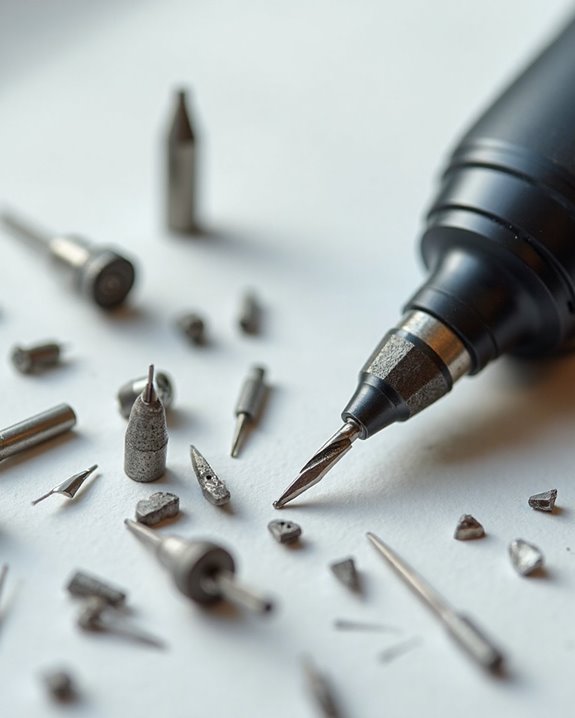
As you dive into the world of nail drill bits, you’ll quickly notice that the material they’re made from plays a critical role in their performance, compatibility, and overall suitability for different tasks. Ceramic bits, for instance, boast a high heat coefficient, prevent overheating, and work efficiently at speeds up to 20,000 RPM, making them widely adaptable across various machines. In contrast, Diamond Nail Drill Bits, crafted from the hardest materials, excel in precision tasks like cuticle work, yet produce more dust, friction, and heat, limiting their use with high-speed drills. Similarly, Tungsten Carbide Nail Drill bits, incredibly strong, are ideal for removing tough gels, but they’re less versatile, often risking damage to natural nails if misused. Material truly dictates functionality. Additionally, sets like the Chumia 47 Pcs Nail Drill Bits Set highlight how high-quality ceramic bits reduce heat and dust for safer, more efficient manicures.
Shape and Purpose of Nail Drill Bits
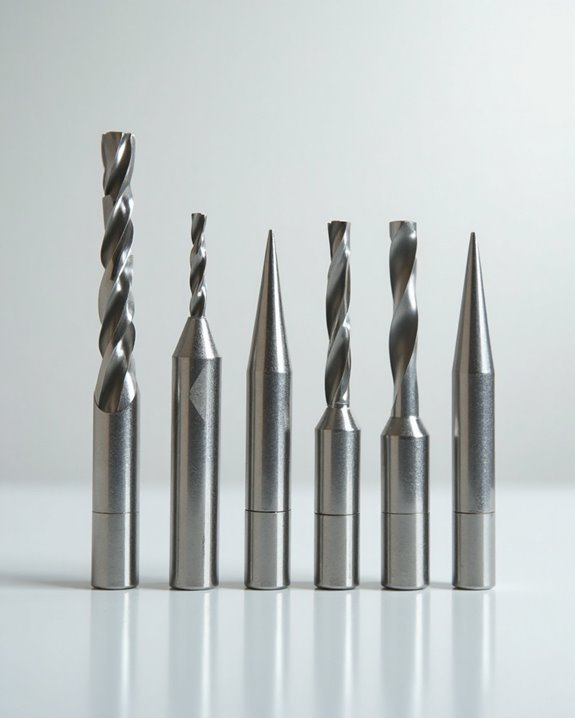
Variety defines the world of nail drill bits when it comes to their shapes, each meticulously crafted to serve a distinct purpose in nail care and enhancement. You’ll find that shapes like the Tapered Barrel are designed for surface work, offering a shorter structure with a flat top for in-fills, cuticle preparation, and controlled product removal.
Beyond that, Cuticle Nail Drill Bits, often cone-shaped, target hard-to-reach spots like under nails and sidewalls, ensuring thorough cleaning without damage to nearby areas. Barrel-shaped bits also excel in surface tasks, such as filing and shaping, with larger versions ideal for backfill cutting. As you explore these tools, you’ll see how each shape, from flame to pointed, meets specific needs with precision and care.
Speed and Machine Requirements
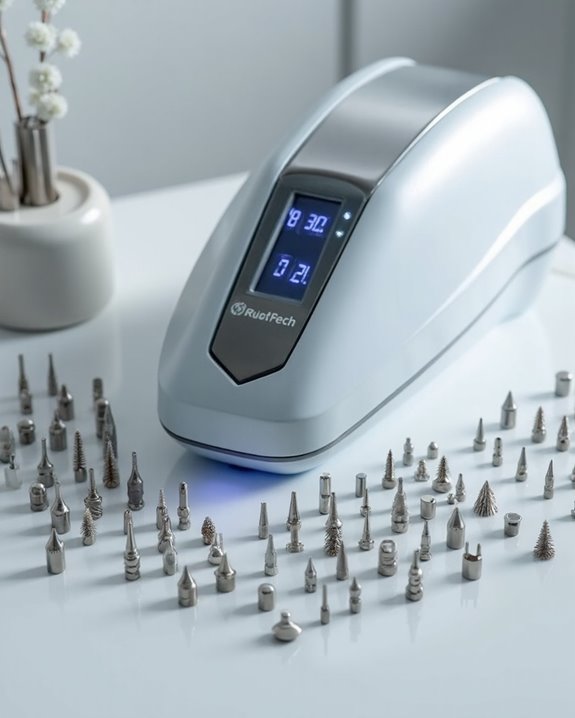
Hey there, let’s dive into the critical aspect of speed and machine requirements when it comes to nail drill bits, a factor that greatly impacts their performance and safety during use. When using electric nail drills, you’ve gotta make sure the bits are designed for your machine’s RPM range, as mismatches can cause inefficiency, overheating, or even hazards. Some bits are optimized for lower speeds up to 20,000 RPM for delicate tasks like polishing, while others handle higher speeds, around 35,000 RPM, for tougher jobs like acrylic removal.
With professional electric nail drills, adjustable speed settings demand bits that perform reliably across ranges, so always verify compatibility. Mismatched speeds can wear bits out prematurely, risking damage or friction during operation.
Tips for Selecting the Right Bit
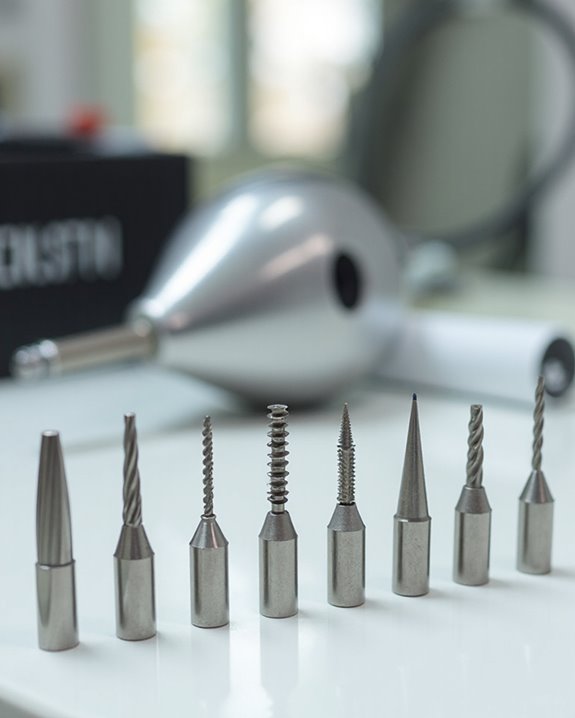
How can you make sure you’re picking the perfect nail drill bit for your needs? Start by checking the shank size, typically 3/32 inch (2.35 mm) for most drills, verifying compatibility, or using an adapter for 1/8 inch bits. Focus on the materials of nail drill bits, like carbide for acrylic removal, diamond for cuticle precision, or ceramic for heat-free high-speed tasks, to match your specific job.
Next, consider grit levels for the right bit, such as coarse grit for bulk product removal, ideal at extra coarse levels, while finer grits suit polishing natural nails. Finally, match shapes, like barrel for surfaces or cone for tight spots, and verify speed compatibility, ranging from 20,000 to 35,000 RPM, for safe, efficient results.
Expert Insights on Bit Usage
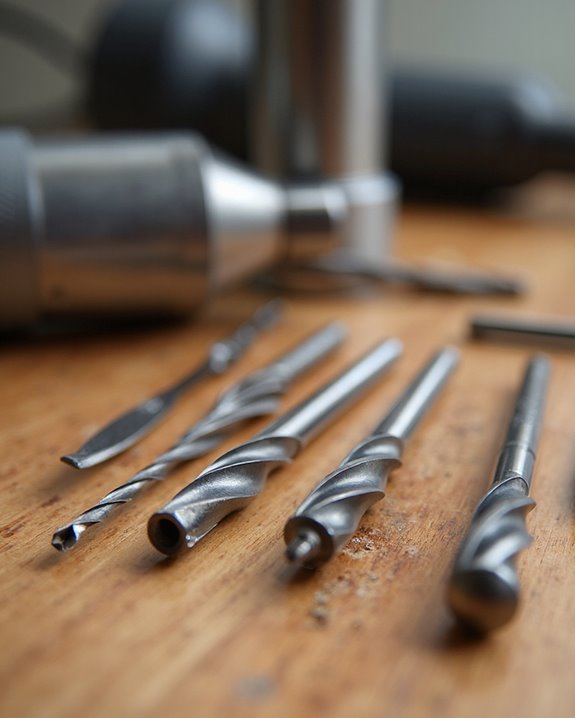
Professionals in the nail care industry offer valuable guidance on using nail drill bits effectively, emphasizing the importance of compatibility and purpose-driven selection for best results. When you’re choosing bits, verify the shank size matches your drill, typically 3/32 inch for most professional models, or use adapters for 1/8 inch bits to avoid operational issues. Experts also stress material selection, recommending carbide bits for tough acrylic removal due to their durability, while diamond bits excel in precise cuticle work to prevent damage.
Additionally, match the bit to your machine’s RPM, often up to 20,000 for polishing, and consider grit levels, with coarse for bulk removal and fine for smoothing. Explore different types through user feedback, verifying versatility and quality for all nail tasks.
Frequently Asked Questions
Do All Nail Drill Bits Fit All Drills?
Hey, finding the right nail drill bits is like hunting for the perfect puzzle piece. You’ll see that not all bits offer Shank Fit across Drill Models. Sometimes, Adapter Use is your only fix!
What Size Is the Universal Nail Drill Bit?
Hey, wondering about the universal nail drill bit size? You’re looking at 3/32 inch under Size Standards. Drill Gauges confirm this, and Bit Dimensions match most machines, so you’re good to go!
Do All Drill Bits Fit All Drills?
Imagine your drill as a key to a unique lock. Do all drill bits fit all drills? Nope, they don’t! Shank Sizes vary, Bit Standards differ, and Tool Adapters might be your only workaround.
Are Nail File Bits Universal?
Hey, wondering if nail file bits are universal? They’re not, since Bit Maintenance, File Durability, and Shape Options vary. You’ve gotta match them to your drill’s specs for safety and the best results.


